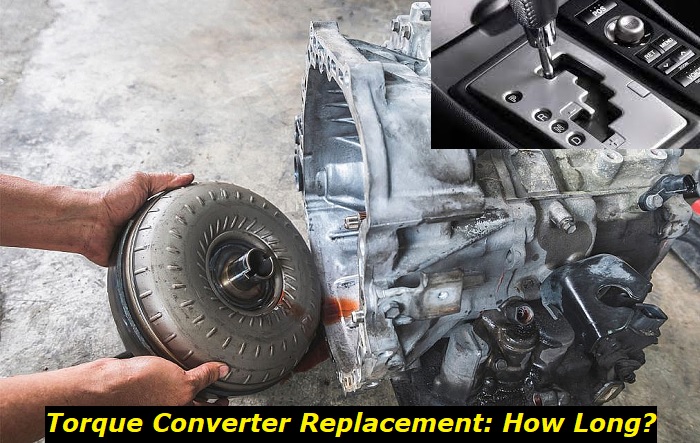Any traditional automatic transmission has a torque converter inside. This is the kind of clutch or coupling that is used in the system of automatic transmissions. The torque converter is filled with transmission fluid and it serves to convert the torque that is produced by the engine to the power that rotates the wheels.
Transmission repair highlights
- Level of importance:High
- Time interval:When broken
- Needed expertise:High
- Needed tools:Professional set of tools
- Time taken:2-20 hours
- Possible issues:Transmission not shifting, gearbox freaking out, car may be in limp mode.

Professional torque converter replacement - time questions
The torque converter is located inside the transmission. In most cases (pretty much always) the transmission needs to be taken off the vehicle if the converter has to be replaced. Otherwise, you will not be able to get the converter out.
The procedure is pretty complicated because, in the majority of car models, you will need to take apart half of the vehicle to just get your hands on the transmission. Hence the duration of the torque converter replacement just can't last one or two hours.
Here are some stages that a mechanic will have to go through:
- lifting up the vehicle and letting it cool down before the work starts;
- taking off any undercarriage protection and splash guards;
- figuring out how to take off the transmission (often the underframe needs to be taken off, too);
- draining the transmission fluid to avoid spillages;
- taking off the axles to relieve the transmission;
- unscrewing transmission bolts and taking off the transmission;
- locating the transmission in a comfortable place to work with it;
- taking off the torque converter and inspecting all the needed parts;
- installing the new torque converter;
- assembling the vehicle back, filling up the new transmission fluid, and checking up on the results.
If you think this can take less than 4 hours, you should try doing this yourself. Also, in some vehicles, the work may take longer than one day because taking off the transmission will require disassembling half of the car. This is especially true for high-performance vehicles and for luxury cars that have very complicated construction.
So, this is not a fast task and, of course, it's going to cost you some money, so it will take 4 to 10 hours, in most cases.
How much will the torque converter cost in parts in labor?
The price of the torque converter highly depends on the brand. For an average car, it may cost from $200 to $600, but for some luxury vehicles, the price may appear to be significantly higher. Also, add some money for the new transmission fluid. It's worth changing the transmission filter, in this case, and this will add some more costs.
When it comes to labor, the average cost for replacing the torque converter will range from $500 for simple and budget-friendly cars with simple construction to $1200 for luxury vehicles, high-performance cars, etc. The price doesn't depend on the price of your vehicle but it rather depends on how complicated it is to take off the transmission.
So, you may spend $700 to $2000 for the torque converter replacement and this will last between 4 hours and two working days.
Now, you may think that paying so much for labor is not an option. And you may want to replace the torque converter yourself. This will most likely make you spend between $500 and $1200 for parts and also about two days of your work given you are a mechanic and understand what you should do. If you don't have any experience, my recommendation is to stay away from this procedure.
What are the difficulties of DIY torque converter replacement?
Even if you are a good car mechanic, it doesn't mean you would prefer spending two days with your car. Also, you will most likely need some help because I can't imagine a successful solo job when it comes to taking off the transmission. Making it any other way but on a car, lift seems impossible, so you will need to rent a place with a car lift - add some money for that, too.
Then, there are other difficulties that can emerge:
- in the majority of modern vehicles, taking the transmission off the car is not a simple job;
- you need to know how exactly you can unscrew all the bolts holding the transmission, otherwise, you can break some important parts;
- your transmission torque converter is a tricky part and any mistake in putting it in its place may be fatal;
- there is a special procedure for installing the new torque converter and you need to know about it;
- it's quite hard to catch the proper transmission fluid level when refilling it and many transmissions don't have dipsticks to check the level;
- any mistake in assembling and installing the transmission may cause the death of the transmission.
I can continue but I think it's enough to understand that you should take that wrench in your hands in that case only if you perfectly know what to do. The torque converter replacement is obviously not the kind of DIY job in car repair and it's not exactly the type of work you want to do on your own. In most cases, you will still need professional help at some point and it will cost you even more in the end to ask a mechanic to come to the place where your car is hanging out on a car lift.
What are the signs that your torque converter is dead?
On the one hand, it's not that hard to understand that the torque converter in your vehicle is dead or dying. On the other hand, these symptoms can be misinterpreted and they may tell you about some other problem in the vehicle.
Before you buy the expensive torque converter and start all these procedures with replacing it, better have the transmission inspected in a good repair shop or in a dealership. Using proper diagnosis techniques, a professional mechanic will quite easily find the problem and will prove that the torque converter has to be replaced.
Here are the common symptoms of a dead or dying torque converter:
- your transmission is slipping - you press the gas pedal and don't feel the immediate acceleration, but the tachometer needle goes up and then gradually goes down before the car starts accelerating;
- your transmission doesn't shift the gears or makes it with significant punches, you may notice that the pattern of changing gears is now random and the vehicle may work in all kinds of different RPM ranges;
- you can't hold a certain speed - you see that the engine RPM goes up and down but the speed doesn't change and vice-versa - speed changes while the RPM is stable;
- transmission shudder at idle or at some certain speed is also a sign of a faulty torque converter and it usually appears when the part is almost dead;
- unusual noise when the engine works - this may be a whining or a grinding noise in the transmission, also the noise can get louder when your transmission moves to another gear.
Usually, you will notice such side symptoms as poor acceleration, bad gas mileage, unstable engine work when in gear, different error messages connected with the transmission, and maybe even the transmission warning light on the dash which is the gear with the exclamation mark inside.
But you should know that the majority of these symptoms may also tell you about some other issues with your transmission, ECU, engine, or other units. So, before you decide to replace the torque converter, have the vehicle inspected. This may save you thousands of dollars and days of your time.
Final thoughts
On average, a torque converter should last about 150,000 miles. Most manufacturers claim that their torque converters last as long as the engine may last and don't need replacement or repair. But you may notice bad torque converter symptoms much earlier than that when the engine is still good to go.
The reasons for the early torque converter death are very simple: low transmission fluid level or overloading (towing or hauling something too heavy). Also, torque converters in performance cars are more likely to fail at high mileage.
Keep an eye on transmission fluid level and don't abuse your car and you won't need to pay for torque converter replacement. If a bad thing happened with your vehicle and the torque converter dies, just have it replaced in a trusted repair shop. A DIY job is not the best solution, in this case.
About the authors
The CarAraC research team is composed of seasoned auto mechanics and automotive industry professionals, including individuals with advanced degrees and certifications in their field. Our team members boast prestigious credentials, reflecting their extensive knowledge and skills. These qualifications include: IMI: Institute of the Motor Industry, ASE-Certified Master Automobile Technicians; Coventry University, Graduate of MA in Automotive Journalism; Politecnico di Torino, Italy, MS Automotive Engineering; Ss. Cyril and Methodius University in Skopje, Mechanical University in Skopje; TOC Automotive College; DHA Suffa University, Department of Mechanical Engineering






Add comment